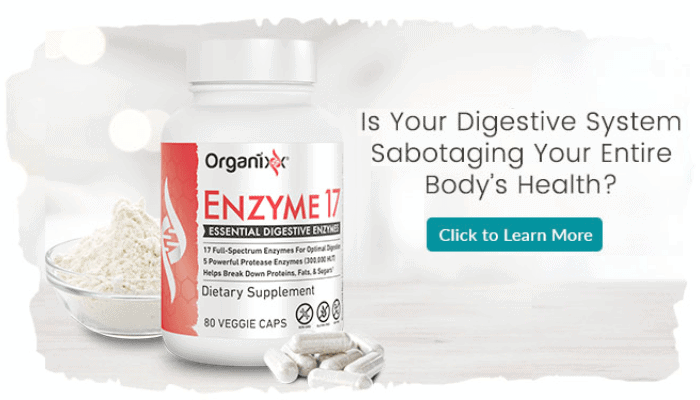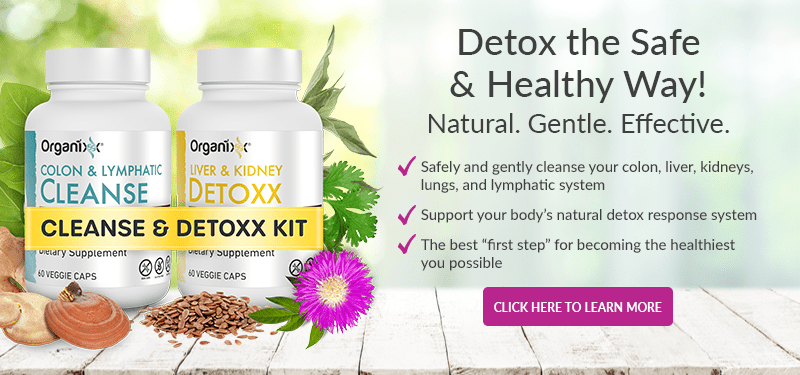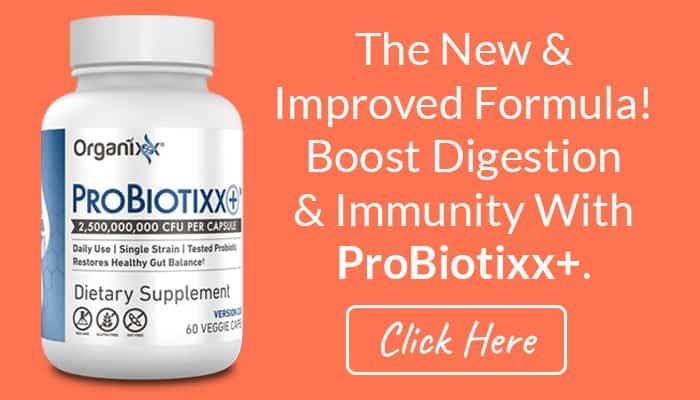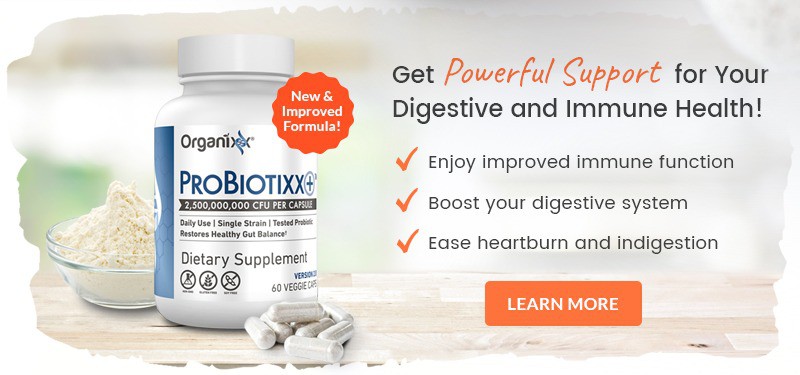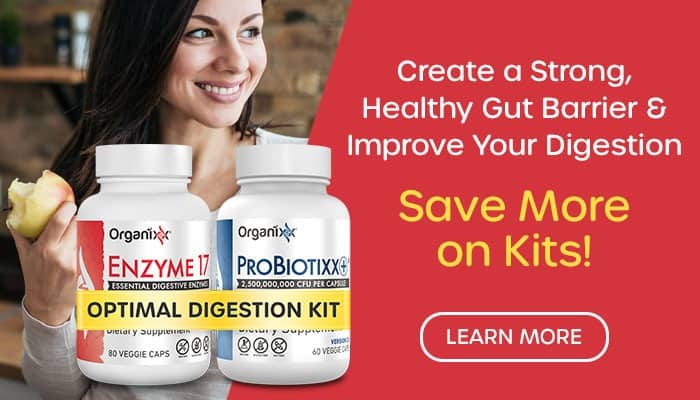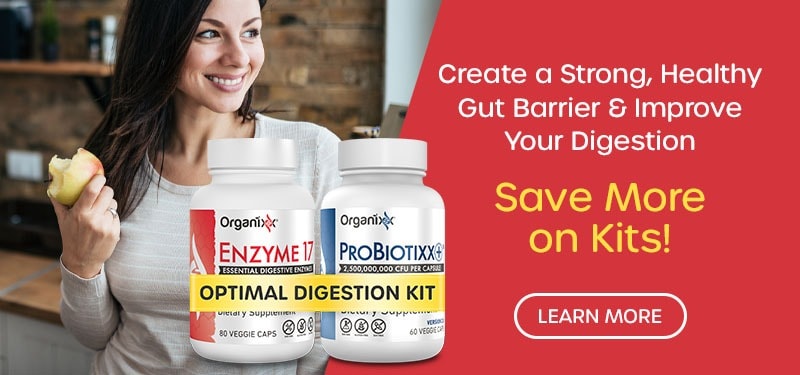Video Transcript:
Today, I want to talk to you about how to optimize health for men, and this is a really important topic because a lot of men rely on their partners, their spouses, to give them advice and tips on what supplements to take. Often, we as women in our households are supplying our gentlemen with supplementation.
Support Your Healthy Habits
So today, I’m going to offer some advice for any of you ladies who want to power up and support your male partner’s health and enhance their wellness, as well as any of you gentlemen looking for some basic guidance to help support your overall health. And this is going to really support and supplement any of the good, healthy lifestyle habits and maybe current lifestyle changes you’re implementing where you’re eating healthy foods, maxing out your sleep, and lowering your stress.
Address Nutritional Deficiencies
So, the first and most important thing for men to consider taking is a whole-food, plant-based supplement, and this is really, really critical because the multivitamin that has a good amount of bioavailable, plant-based nutrition can really create a foundational piece where you get a lot of the daily requirements of your nutrients, and a lot of health issues, when we look at aging and degeneration within the body, a lot of our problems or challenges ultimately come back to nutrient deficiencies.
So, I’m very excited to recommend the Multi-Vita-Maxx. This is our plant-based, powerful multivitamin. You’re going to get all of the required daily requirements of both your vitamins as well as key minerals like magnesium, and zinc, and chromium, which is really important for gentlemen looking to balance their blood sugar levels. I also like that this is a fermented form of a multivitamin, which enhances the bioavailability of this nutrition.
Get the Gut Healthy
Now, the second thing that’s really important is for gentlemen to support their gut health. We have a term that we reference to the balance of bacteria in the gut, and we call it the microbiome. That’s an assortment of bacteria that we want to be balanced and we want it to be very plentiful and very similar to like a coral reef – we want to have multiple types of bacteria that create this kind of rainbow cascade of good bacteria that balances our body.
And in one of my masterclasses, I host masterclasses every month, I have one of my masterclasses that digs into mastering your gut health and ultimately supporting your gut microbiome. One of the things I share in that class is that the microbiome, our microbes, the actual bacteria, enhances our hormone levels and it can actually influence our immune system and it can influence the inflammatory response in the body.
So, for any gentlemen who might be dealing with diabetes, or gout, or liver imbalances, maybe elevations in cholesterol and triglycerides, or even gentlemen who might be dealing with prostate imbalances, it’s really important for us to look at adding a good probiotic.
And we have ProBiotixx+, which is a very powerful form of L. plantarum, which we know is one of the super plentiful bacteria types that can help culture and rebalance your gut. So, making sure you get a good probiotic can be very beneficial in enhancing your overall gut health, which can balance your digestive grievances like IBS, or CIPO, or gas and bloating after consuming a meal, but it can also power up our brain health and balance our hormones.
Combat Inflammation to Prevent Illness & Disease
Now, another thing that is really important for men is to address inflammation. Ultimately, inflammation is the root of all illness and disease within the body, and systemic inflammation is something we need to combat. And signs or symptoms of inflammation can be swelling, it can be elevations in enzyme levels like our ALT and AST – those are labs that identify enzyme levels in our liver. We will present with hormone imbalances. Men will have elevations in prostate markers like PSA will be elevated or experience benign prostatitis. Other individuals might experience heart disease. And so rooted behind all of these illnesses and diseases is ultimately inflammation. Our cells, our cytokine process is overwhelmed and heightened, and there are really two ways that I use some supplementation here to combat inflammation.
The first thing is magnesium, a very well-balanced, multi-magnesium, like we have Magnesium 7. This can be really helpful in minimizing inflammation that gentlemen experience in their joints. Maybe you have joint pain, or osteoarthritis, or rheumatoid arthritis, and even gout.
Swelling is a byproduct of inflammation. So, if you notice you’re holding more fluid, Magnesium 7 is what I recommend. I’m kind of an expert in the swelling category, I’m specialized in lymphatic therapy, which is all about moving the excess fluid in the body. We use magnesium to flush fluid out of the body and it will flush fluid through the kidneys and bladder and you might notice a reduction in fluid retention of upwards of three to five pounds on the scale. So, Magnesium 7 is great for lowering your inflammation levels.
Address the Reduction in Stomach Acid & Enzymes As We Age
And then, last and final is at the age of 30, for all of us, men and women, we have a reduction in stomach acid levels and we start to notice that the pancreas is not producing enough digestive enzymes. That ends up leading to digestive grievances, imbalances in our digestive process, an inability to digest our food, assimilate the nutrients, and power up the body. That can also lead to constipation, and leaky gut, and gut-brain, gut-heart, gut-thyroid imbalances.
So, one of the best ways to combat this lowered stomach acid level and a reduction in digestive enzymes that your pancreas is producing – which by the way can often be an undercurrent for diabetes – Enzyme 17 is something you want to add to your daily practice and this is something where you take two of these supplements, about 20 to 30 minutes before you consume a meal.
Enzyme 17 is one of the most plentiful enzyme blends that is out there on the market. It’s one of my favorite products we have here at Organixx, and it can help your body digest and break down the assorted macro and micronutrients that you need to support your body.
Additionally, here is a bonus tip that I tell all my patients. If you are dealing with any inflammation, or maybe you have digestive imbalances you notice. Maybe there are food particles that you’re passing in your bowel contents. Enzyme 17 is something you can take at night on an empty stomach and it will help reduce the digestive grievances and will help clear up systemic inflammation.
So, that’s a little bonus tip, but overall, these four items are going to be very helpful in supporting overall men’s health, and are basic foundational elements that every gentleman should add to his daily supplement regimen. So, that’s my tip for you and I hope you share that with any of the gentlemen in your life. And gentlemen, if you have any questions about health and wellness, make sure you comment and hit that reply button and I will be taking questions and answering them in future videos.
Organixx Enzyme 17 contains a whopping FIVE kinds of powerful protease enzymes in combination with one of the most advanced enzyme blends on the planet. It’s scientifically designed to help your body break down and process nutrients for better absorption, digestion, and overall health.
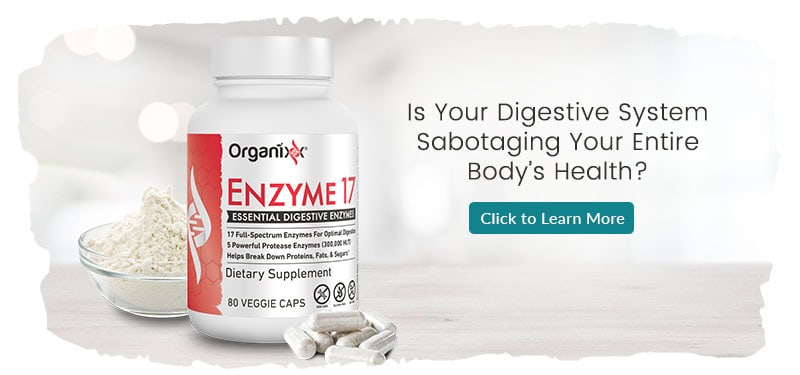
The pace of life makes most of us feel stressed, frazzled, and just plain exhausted at the best of times. Then, whether it’s tackling major life changes, the busy holiday season, providing care for others, or simply getting through everyday life, this all can lead to unhealthy habits and the feeling that a detox might be just the thing.
But how do you cleanse and detox your body without spending hours doing research or breaking the bank? Detoxing doesn’t have to be complicated. One clever way to help your body’s own natural detoxification systems is to add some simple detox practices into your life on a daily basis.
What Does Detox Mean?
 Detoxification refers to helping your body “clean out” your internal organs to rid them of bad bacteria, poisons, pollutants, and especially food waste.
Detoxification refers to helping your body “clean out” your internal organs to rid them of bad bacteria, poisons, pollutants, and especially food waste.
Granted, your body is detoxifying itself all of the time. After all, that is part of the job description for the colon, lungs, kidneys, lymph glands, skin, and especially the liver.
However, with everything toxic that’s in our environment, combined with what we’re slathering on ourselves and ingesting, it’s a good idea to give your organs a helping hand periodically.
Focus on These 7 Key Areas for the Best Detox Cleanse
If you want to cleanse and detox your body the easy way, start small and take tiny steps in each of the seven broad categories listed below. If you’re consistent, over time you will establish healthy detoxification habits that will stay with (and benefit) you for a lifetime.
#1 – WHAT YOU EAT.
Let’s start with the basics. Your diet can either add to your toxic load or help you detoxify from it. Whole foods are what you are aiming for to help your body eliminate toxins. Greens like celery, spinach, parsley, kale, and cilantro contain fiber, phytonutrients, and chlorophyll (the substance that makes plants green).
Chlorophyll is especially great for detoxification since it cleanses the blood, is a super anti-inflammatory [1], and can bind with heavy metals. It also protects against DNA damage caused by Aflatoxin-B1 (AFB1) [2], which has been linked to liver cancer. [Note: Aflotoxins are cancer-causing substances produced by certain types of mold and are commonly found in peanuts, grains, corn, and cottonseed meal.]
And don’t forget fiber! Getting enough soluble and insoluble fiber in your diet every day is essential for pulling toxins out of the 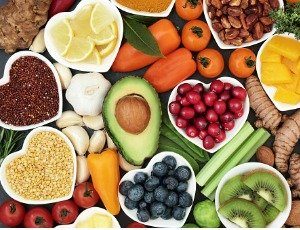 gut and cleaning the colon.
gut and cleaning the colon.
A 2015 study [3] published in the Annals of Internal Medicine found that people who simply ate 30 grams of fiber every day lost more weight and stabilized their blood pressure more than those who engaged in complicated dietary changes.
What You Can Do Now: Crowd out junk food slowly by focusing on your main meal of the day. Whether you consider this breakfast, lunch, or dinner, make sure you add a healthy amount of green vegetables to your plate.
If you don’t like salads, try steamed veggies sprinkled with a little sea salt and some extra virgin olive oil. Another option is to replace a meal with a nutrient-dense smoothie that includes healthy ingredients such as wild blueberries and broccoli sprouts.
#2 – WHAT YOU DRINK.
Besides eating healthy foods, drinking enough fresh, filtered water is absolutely vital for detoxification. Think of your bloodstream and intestines as a plumbing system. It takes water to flush all that bad stuff out of your body and down the drain.
Water is especially helpful for the kidneys since these glands need it to get rid of certain waste products. Make sure you drink only fresh, filtered, fluoride-free [4] water.
A good tip if plain water isn’t your thing is to add healthy substances to your water glass and turn them into detox waters. A very basic detox water is a little lemon juice added to 8 ounces of water first thing in the morning, which can help with alkalinity.
Plop some cucumber or a few watermelon slices in your water glass for a refreshing and hydrating treat.
To go for the big guns when it comes to health, try some apple cider vinegar (ACV) diluted in water first thing in the morning. Besides its amazing detox effects, ACV is chock full of vitamins and minerals [5], helps balance gut bacteria, and is amazingly immune-supportive. It also has antimicrobial and antifungal effects [6].
What You Can Do Now: For the next week, try drinking a tall glass of water first thing in the morning. If you want a real health boost, add a little bit of ACV to it. Start with a teaspoon and work up to a tablespoon or two in 8 ounces of water upon rising. Take note of the difference this one change can make in your overall energy levels throughout the day.
#3 – GO ORGANIC.

Going organic as much as possible in what you eat and drink can be a huge step towards living a low-toxin life.
A general rule of thumb for clean eating is to steer clear of commercially-raised meats and dairy.
According to the advocate organization Consumer Reports [7], a whopping 80% of antibiotics sold in the U.S. are used for livestock. In addition, commercial dairy may contain high levels of cancer-causing dioxins, since they are mostly stored in animal fat.
The World Health Organization found that the majority of human exposure to dangerous dioxins comes from animal products [8]. If you eat meat and dairy, make sure you get pasture-raised, hormone-free, and organically raised and non-GMO-fed products only.
When it comes to fruits and vegetables, be aware of the “Dirty Dozen.” A current list is provided annually by the consumer safety organization, the Environmental Working Group (EWG).
What You Can Do Now: Go online and check out EWG’s current “Dirty Dozen” list [9] now (some of the foods on the listing can change from year to year). Then, make a point the next time you shop to go only organic for these particular fruits and vegetables.
#4 – HOW MUCH YOU EAT.
Wise individuals through the ages have recommended eating less and going on fasts to clean out the body and boost both physical and mental energy. Nowadays, research continues to pour in about the benefits of calorie restriction as well as routinely spending some time not eating at all.
The connection between fasting and detoxification is clear. Fasting kicks in “autophagy,” the process of cellular self-digestion.  When the cells starve, they begin to eat themselves. This is a way of breaking down and getting rid of damaged cells, which are then used as recycled energy.
When the cells starve, they begin to eat themselves. This is a way of breaking down and getting rid of damaged cells, which are then used as recycled energy.
Studies show that fasting can rid the body of unwanted pathogens, improve brain health, and regulate metabolism.
Fasting is a great way for your body to “clean house”… and the best part is it’s free!
As it turns out, you don’t need to spend days sucking on ice cubes to gain the health benefits associated with fasting. “Intermittent Fasting” (IF) also stimulates autophagy. Intermittent fasting refers to alternating times for eating and not eating. Many individuals adopt the 16/8 rule. They fast for sixteen hours, including sleep time, and eat only during an eight-hour window (noon to 8 pm, for example).
A 2017 study conducted by the University of California, San Diego, found that intermittent fasting improved
“(a) circadian biology, (b) the gut microbiome, and (c) modifiable lifestyle behaviors, such as sleep.”
As far back as the early 1980s, researchers at City Hospital in Baltimore found that IF increases lifespan [10].
What You Can Do Now: Start with a food journal. Write down what you eat for one day, then reflect on it. Were there times that you ate even though you weren’t hungry? Perhaps you reached for that bag of chips because you were stressed or just bored?
Being aware of our eating patterns as they are right now is the first step in changing them. After a few days of observing what you eat, experiment with extending your non-eating time a little.
If you have hypothyroidism or adrenal fatigue, take it slow and monitor your energy. Be sure to seek the advice of your healthcare provider before you start if you have either one of these conditions.
#5 – HOW YOU MOVE.

Besides what you eat, getting enough physical activity is probably THE BEST thing you can do to keep your body detoxifying naturally every day. It may be hard to see the connection at first. Take a look at the links between exercise and detox, however, and you’ll be convinced:
- Aerobic exercise makes you sweat, which helps to eliminate toxins through the pores.
- Exercise in general increases and regulates breathing, which helps detox through the respiratory system.
- Aerobic exercise also pumps oxygen into the bloodstream, which cleans it out and increases blood flow. The faster the blood circulates, the faster lymph fluid can circulate as well.
- A 2018 study published in The Journal of Applied Physiology found that during a workout, muscles act much like the liver. They produce enzymes that clear out toxic chemicals [11].
- Aerobic exercise is a catalyst for the production of endorphins [12] and other “feel good,” healing hormones.
- Taking a walk, stretching, doing tai chi, or moving your body in another way outdoors fills your body with hormone-balancing vitamin D, which assists all your organs and your detoxification pathways.
- Finally, it’s not just fast-paced cardio that can help you detox. Stretching activities such as yoga can help you as well. A 2018 study in the Indian Journal of Medical Specialties found that yoga helped pregnant women increase internally-produced antioxidants [13].
What Can You Do Now: Haven’t exercised in a while? Start slowly by committing to take a brisk walk around the block at least two times this week. Even a 15-minute jaunt on your lunch break can do wonders to get you moving again. Note the difference this little bit of movement may have on your overall energy level for the rest of the day.
#6 – HOW YOU HANDLE STRESS.
Being consistently stressed out can take a major toxic toll on your body. This is because chronic stress produces extra cortisol, which can lead to inflammation and sluggish systems that just get sluggish over time as they build up with waste.
Cortisol is surging through the body night and day and also has the ability to shut down key immune system cells involved in hunting  out and destroying viruses, bacteria, and other pathogens.
out and destroying viruses, bacteria, and other pathogens.
Stress can also change DNA, and those changes may be passed on to our children. Researchers at the University of Alabama found that traumatic and stressful events that happened early in life affect the BDNF gene [14]. BDNF is responsible for making certain proteins found in the brain and spinal cord.
The bottom line regarding stress is if it gets out of hand, it can absolutely lead to more toxic sludge in your body and a weakened immune system that will not be able to handle it.
What You Can Do Now: The opposite of the “stress response” for your body is the “relaxation response.” That is the sweet spot for detoxing since in this zone all of your metabolic energy is focused on healing the major organs, including your liver and kidneys.
The good news is that there are tons of ways you can employ to go from stressed to smiling. Exercise, hydrating, and eating healthy can help in this regard. So can meditation. You don’t have to spend hours at it to get results, either.
A 2014 study published in the journal Psychoneuroendocrinology found had healthy individuals who practiced mindfulness meditation for just 25 minutes 3 days in a row experienced a lessening of psychological stress activity in the brain [15].
Again, start out slow with 5 to 10 minutes of observing the breath every day and go from there. When it comes to all the benefits meditation can have on the brain and body, consistency is key.
#7 – WHAT SUPPLEMENTS YOU TAKE.
Last but not least is the issue of supplements. Many experts feel that taking key quality supplements is a necessary part of leading a healthy life in our pollutant-riddled world.
We tend to agree. Luckily, we can now marry the wisdom of nature with advanced delivery systems. When it comes to detoxification, take supplements that support your body’s own natural detox mechanisms.
What Can You Do Now: How do you know what supplement is right for you and your detox pathways? For best results over time, we recommend high-quality, organic, multi-nutrient supplements that are easy to take every day and gentle on the system.
Organixx Cleanse & Detoxx is a two-step formula that provides a gentle yet powerful full-body detox using organic botanical ingredients. Naturally purge your body of toxins, chemicals, free radicals, heavy metals, waste, as well as bacteria, and pesticides. Easily cleanse your colon, liver, kidneys, lungs, and lymphatic system resulting in increased energy, and better digestion with more nutrient absorption, in addition to improved immunity, mental clarity, and overall health and wellbeing.
Exercise improving cardiovascular health? You bet! Exercise helps you lose weight? Makes sense! Exercise strengthening bones and building muscle? For sure! But what about exercise for improving your gut health? If you think the connection may be stretching it a bit… read on! New research is proving the correlation between physical fitness and improvement in the gut microbiome.
The Importance of Gut Microbiome Diversity
To discover the connection between working out and gut health, let’s look at what constitutes a “healthy gut” in the first place. You may think it has to do with having a plethora of good bacteria and doing away with all those “bad” bacteria that can wreak havoc on your GI tract and your whole body.
If so, you may be seeing only part of the picture. Experts do agree that a larger proportion of good bacteria versus opportunistic (“bad”) bacteria is better than the reverse. However, it is the diversity of bacteria in your GI tract in general that moves the body towards health.
Think of it this way: would you rather meander through a beautiful garden that is full of a variety of wonderful vegetables, herbs, fruits, and flowers, as well as bees, butterflies, and hummingbirds? Or a sterile wasteland with just a few patches of manicured grass? Diversity is healthy. This is one thing our aesthetic sense – and our bodies – know for sure!
Studies have shown that gut flora diversity can lead to lower weight gain [1] and the prevention of chronic diseases. One 2016 study by French investigators suggested the reintroduction of certain key predatory bacteria into the gut environment (especially those typically lost by eating a Western diet), for improving overall health [2].
To understand the importance of gut bacteria diversity, consider this statement published in a report for the journal Current Allergy and Asthma Reports [3] by representatives from the World Universities Network, Deakin University in Melbourne, and the Perth Children’s Hospital:
“…the impact of changes at the immune-microbiota interface are directly relevant to broader discussions concerning rapid urbanization, antibiotics, agricultural practices, environmental pollutants, highly processed foods/beverages and socioeconomic disparities–all implicated in the NCD [Non-communicable diseases] pandemic.”
The Australian study examined data on lack of gut diversity and diet and saw it as part of the global health crisis known as dysbiosis, or “life in distress [4].”

Exercise and Gut Health: What the Research Shows So Far
While science now confirms the importance of gut biodiversity for overall health and has also linked lack of diversity to the “Standard American Diet,” the connection between exercise and gut health, in general, is still relatively unknown. The evidence is mounting, however.
New research out of Canada published in the journal Microbiome found that increased cardiorespiratory fitness can increase diversity by about 20% [5]. The researchers from the University of British Columbia noted this connection after witnessing butyrate levels going up dramatically after exercise.
Butyrate is a short-chain fatty acid which is associated with beneficial bacteria. Some of this bacterium include various kinds of Erysipelotrichaceae, Roseburia, Clostridiales, and Lachnospiraceae.
Evidence suggests that short-chain fatty acids can reduce the risk of type 2 diabetes, obesity, heart disease, and other kinds of inflammatory diseases.
On the other hand, another study conducted by Washington University found that obesity may correspond to higher numbers of “energy harvesting” gut bacteria [6].
Still, others have found that the reverse is also true: increased movement can lead to lower numbers of these kinds of bacteria and increased numbers of “lean microbiota.” The way gut bacteria affect obesity is often referred to by looking at the ratio between two types of common gut bacteria: Firmicutes and Bacteroidetes [7].
On a similar front, a 2014 investigation conducted by the Mayo Clinic and published in the journal Molecular Neurodegeneration found that both improved diet and increased exercise can have an effect on anxiety levels as well as cognitive health specifically through changes to the gut microbiota [8].
And finally, perhaps the most significant study on the subject came out this year (2018) through the University of Illinois at Urbana-Champaign. This was the first study ever to prove that gut bacteria diversity can be enhanced by exercise alone [9].
Ready, Set, Get Moving (and Stay Moving!)
If you think that such drastic changes in your gut microbiome are only for high-powered athletes, think again! The studies mentioned above used a variety of movement and endurance modalities at different levels to prove that exercise improves gut health.
The consensus amongst them all, however, is that for positive changes in gut health to stick, exercise must be done consistently and regularly.
For example, in the University of Illinois study, participants did aerobic exercises for 30 to 60 minutes, three times a week, for six weeks. They then took six weeks off, reverting to their sedentary lifestyles. Measurements taken after the six weeks of cardio showed drastic changes such as the ones mentioned above. After six weeks of not exercising, however, gut flora diversity returned to the pre-exercise state.
“This tells us that exercise needs to be done regularly and that stopping exercise causes reversion, not surprising as this is evident in other exercise training-induced adaptations in other tissues like muscle,” says Dr. Jeffrey Woods, Ph.D., head researcher of the University of Illinois study and professor of kinesiology and community health.
A New Way of Looking at Exercise Health Benefits
The gut microbiome is the storehouse for over 80% of your immune system cells [10]. And as we have just discovered, the bacteria that live in there are responsible for everything from the mental capacity to weight gain. The field of physical fitness, as well as the presence of the gut microbiome, is just beginning, and those doing this research hope it will spread awareness for everyone’s health.
“They [i.e., gut flora] have been completely ignored until about ten years ago. Now there has been an explosive growth of interest in this area,” said Dr. Emeran Mayer, author of The Mind-Gut Connection, in a recent interview for the online publication Healthline [11]. He went on to explain:
“They have a very important role in all aspects of health, particularly metabolic health. They have a very important role in most of our organ functions and… play important roles in some disease like obesity, depression and autism spectrum disorders.”
According to 2010 statistics, between 60 and 70 million Americans suffer from some kind of gut discomfort, condition, or disease. By now this number may be much higher. The biggest factor in determining gut health, and health in general, lies in microbiome diversity. But now you can take action with an easy way to help your gut and the rest of your body…
Get moving, stay moving, and make a difference in your health today!
Organixx ProBiotixx+ formula contains a single, super-strain of Lactobacillus plantarum, designed to help alleviate constipation… eliminate gas and belly bloat… support your entire immune system… and give you total digestive protection.
Want to maintain that positive mood, keep your energy levels high, and just feel GREAT every day? Achieve all of this and more with your next liver detox!
Why would detoxing the liver naturally have such a profound effect on your body, mind, energy level, and overall health? Read on to discover the reasons why.
What Does Your Liver Do for You Anyways?
There are so many functions that this oval-shaped, 3-pound bag of tissue performs in your body (some experts say over 400!) that it would take an entire book to describe them all.
In a nutshell, the liver plays a major role in both metabolism and natural detoxification. It breaks down nutrients from food into forms that can be used in the body naturally. It also stores these substances and supplies the cells with the specific nutrients that they may need at just the right time.
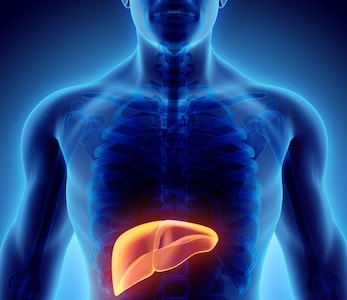
The liver is vital for the breakdown of carbohydrates, fats, and protein. In carb processing, it helps ensure that glucose levels stay balanced.
In the breakdown of proteins, liver cells help convert amino acids from food into substances that can be used as energy. And in fat metabolism, liver cells do basically the same thing – with the help of the gallbladder, it breaks down fat particles into energy.
The liver also has intricate relationships with several other organs. Blood that comes from the digestive system flows through certain areas of the liver bringing nutrients. The liver also works with the kidneys. Ammonia is a byproduct of the breakdown of proteins, carbs, and fats. Liver cells convert this potentially-toxic substance into urea, which is ammonia’s more benign form, which is then transported to the kidneys to be passed out of the body as urine.
And of course, the liver’s function is vitally connected to the gallbladder, which is a small organ located underneath the liver. The gallbladder’s main job is to produce the bile needed for the breakdown of fats.
Liver Health: Liver Function, Fatty Liver & Liver Cancer
Although we now know enough about the liver to understand that it is crucial for the health of the entire body, science is still learning about its connections to specific nutrients, mechanisms, and disease process.
For example, new research is now discovering the link between magnesium deficiency and liver cirrhosis (extensive scarring of the liver) as well as magnesium deficiency and fatty liver disease.
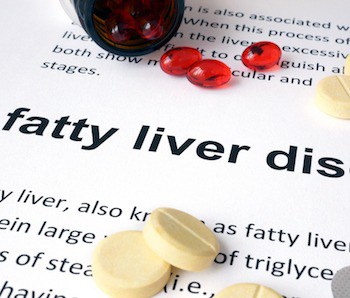
Fatty liver disease, or Hepatic Steatosis, is a condition that is of special concern in this day and age. At one time, fatty liver disease was mostly connected to alcoholism. Over the last decade, however, the number of individuals with non-alcoholic fatty liver disease (NAFLD) has grown exponentially.
NAFLD occurs when the liver is not able to metabolize fats efficiently. According to a 2015 analysis conducted by Thomas Jefferson University,
“there is a worldwide epidemic of non-alcoholic fatty liver disease (NAFLD)…”
According to the American Liver Foundation, roughly 25% of the U.S. population is affected by NAFLD in some way.
Thomas Jefferson researchers call NAFLD a “clinical entity related to metabolic syndrome.” Conventional medicine often connects NAFLD to genetic predisposition as well as obesity and diabetes, although not everyone who is diagnosed with the condition needs to lose weight and/or is struggling with diabetes.
More forward-thinking researchers are now making the connection between NAFLD and environmental and pharmaceutical toxins. Chronic use of certain painkillers as well as the use of certain chemo drugs may be contributing factors for NAFLD.
In addition, a 2017 investigation published in the journal Nature: Scientific Reports made the definitive link between NAFLD and the consumption of GMO foods, especially those that have been sprayed with even the smallest amounts of the pesticide Roundup.
If the connection between chemically produced toxins and NAFLD is correct, then it is no surprise that these chemicals continue to pervade every aspect of our lives. The incidence of not only NAFLD but also cirrhosis, liver damage/failure, and even cancer of the liver will continue to rise as well.
According to the American Cancer Society, the number of liver cancer deaths has increased by three percent every year since 2000. In recent years, over 41,000 Americans have been diagnosed annually with cancer of the liver.
Detox Your Liver, Detox Your Body
In this age of increased toxic load on all levels, including heavy metals, it is imperative that the liver be cleansed on a regular basis. According to both Chinese and Ayurvedic traditions, transitional points of the year (such as the weeks right before the winter and summer solstices) are great times for liver detoxification.
Each of the cleanse modalities listed below can be utilized from one to three weeks. If you are fairly healthy, you should be able to support your liver in these ways while at the same time maintaining a regular schedule.
Although, it may be a good idea to focus on healing as much as possible by keeping extra activities to a minimum during the first few days as your body flushes out extra toxins buried deep within the organs.
Note: If one of your health goals is losing weight and you’ve been unsuccessful, it could be because your body is storing lots of toxins in fat cells. By supporting your main organ of detoxification, you can often give your weight loss efforts a helping hand.
One additional important note. If you have been diagnosed with NAFLD or any other health condition, it would be wise to consult with your health practitioner prior to embarking on any detox diets or other kinds of concentrated cleanses.

#1: Use Gentle Herbals.
Certain herbs can have a profoundly strengthening effect on the liver. Three such herbs that have been used for centuries are milk thistle, dandelion root, and Holy Basil.
Organic dandelion root and Holy Basil can often be found at health food stores in the form of dietary supplements (or in your own backyard). Milk thistle is often sold in supplement form and can be a great boost for the immune system, as well.
#2: Coffee Enema.
Enemas have been used for centuries by Ayurvedic practitioners and some of today’s top natural health experts say that regular coffee enemas are a “must” for a toxic world.
Administering an enema with organic, pesticide-free coffee can be an instant energy-lifter, and here’s why: blood runs through the liver every three minutes.
Retaining coffee in the bowels for just 15 minutes allows it to seep through the intestinal wall and into the “portal vein” of the liver, where it will stimulate the gallbladder.
Coffee also provides the body with the phytochemicals kahweol and cafestol, which can lower inflammation, activate glutathione production, and encourage cellular detoxification. Coffee enemas have also been shown to stimulate apoptosis, or cancer cell death, in some studies.
#3: Try a liver-cleansing “shot.”
It’s not an injection nor does it have anything to do with tequila (except that you might want to do this the morning after you’ve had “one too many”). A liver-cleansing shot is simple to put together and fairly easy to “down.”
Just combine, in a high-speed blender, one whole organic lemon, cut into pieces (rind and all), 1 Tablespoon extra virgin olive oil, and a pinch of cayenne in 6 ounces of pure water.
Blend at high speed until thoroughly mixed. Then strain and drink. You can also sip this infusion throughout the day for a gentler cleanse; just make sure to wait at least an hour before eating.
As a side note, citrus fruits in general are excellent for liver health. Just be sure if you’re consuming any rind that it’s from washed, organic fruit.
#4: Don’t forget the gallbladder.
The liver-cleansing “shot” mentioned above is great for the gallbladder, too, which is a good thing. In order to really cleanse the liver, you also must take the health of the gallbladder into consideration.
To help your gallbladder prevent painful gallstones, stay away from trans fats and processed foods, and make sure to drink plenty of water. For tasty alternatives to plain water, try our detox water recipes.
7 Ways to Keep Your Liver Happy
Now that you know what to do for a deep liver detox, you can help keep this vital detoxification pathway running smoothly all year long by adding these simple tips and tricks to your everyday routine:
- Get sufficient amounts of vitamins K, D, A, B12, B6, and C, as well as magnesium.
- Drink half your weight in ounces of pure, fresh, filtered water daily (e.g. a 150-lb person would drink 75 oz of water). If you have trouble reaching this number you can also count herbal tea, green tea, and the liquids found in foods such as soup towards your total.
- Go easy on your digestive system by limiting grains and red meat and eat lots of fresh leafy greens and cruciferous vegetables which support liver health.
- Move your body in a way you enjoy; four times per week for a minimum of 30 minutes is ideal.
- Practice stress management techniques such as yoga, meditation, journaling, strolling in nature, skin brushing, soothing baths, and self-massage. Put one of these activities on your to-do list every day!
- Take care of yourself emotionally through journaling, talking to a friend or counselor, or practicing the Emotional Freedom Technique. Holding on to negative emotions, especially trauma, can add to your toxic load.
- Consider going on a deeper cleanse whenever you consistently feel fatigued, tired, bloated, constipated, confused, achy, depressed, anxious, or generally “out of sorts”; these are all signs of toxic overload.
Treat your liver with love, live a healthy lifestyle that supports and strengthens it, and give it some time to deeply clean out the large amounts of toxins we’re exposed to in our modern world every once in a while. Then your liver can do what it is meant to do – help YOU stay vibrant, healthy, and strong!
Organixx Cleanse & Detoxx is a two-step formula that provides a gentle yet powerful full-body detox using organic botanical ingredients. Naturally purge your body of toxins, chemicals, free radicals, heavy metals, waste, as well as bacteria, and pesticides. Easily cleanse your colon, liver, kidneys, lungs, and lymphatic system resulting in increased energy, and better digestion with more nutrient absorption, in addition to improved immunity, mental clarity, and overall health and wellbeing.
Everyone needs it in order to live. But what happens when food becomes a detriment to your body rather than a source of nourishment? Nobody wants to feel gassy, bloated, or in pain after eating a meal, and yet these are the types of digestion problems that millions of people suffer from as part of their mealtime ritual.
Food items that should be producing energy and providing physical sustenance, in other words, are actually hurting them. But the question is… why?
For some, allergies are to blame for digestive issues. For others, it’s the growing number of chemical toxins in the food supply. For still others (perhaps most people), it’s a generalized gut imbalance.
This imbalance can stem from not having enough digestive juices − including vital enzymes − to effectively break down food so the body can effectively use it.
Millions of Americans Are Suffering From Digestive Issues
The National Institutes of Health (NIH) estimates that as many as 70 million people in the U.S. suffer from some type of digestion problem. Nearly 50 million ambulance calls are made every year for folks who suffer severe digestive episodes, while more than 21 million hospitalizations take place for the same reason.
Quite soberingly, nearly a quarter of a million people living in the U.S. die every year because of digestive disease.
These are worst-case scenario digestive problems, mind you. Millions more people suffer from everyday stomach aches, indigestion, acid reflux, and gastrointestinal upset after they eat − and perhaps you’re one of them.
Such symptoms might be common in today’s society, but they’re certainly not normal. So, what can you do to overcome them and actually enjoy eating a meal rather than dread it?
5 Ways to Alleviate Digestive Problems
Here are 5 tips that can help prevent and/or alleviate many common digestion problems:
#1: Take Probiotics
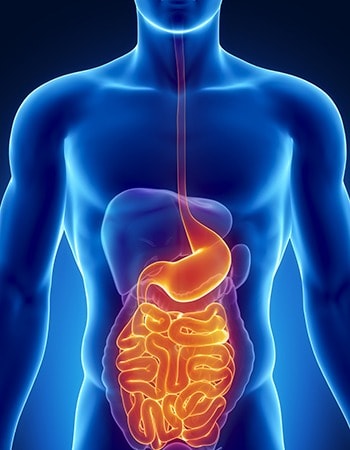
Your digestive tract isn’t just a set of mechanical tubes through which food enters and travels through the body. It’s a vibrant ecosystem made up of beneficial bacteria known as probiotics that function as a living organism to support the body.
It does this by taking the foods you eat and breaking them down into smaller molecules, which are passed through the wall of the digestive tract into the bloodstream for use throughout the body.
This diverse probiotic environment within the gut also functions as a powerful immune defense against pathogenic invaders and toxins. The billions upon billions of beneficial bacterial strains that live within the gut serve as a well-trained army to let the good in while keeping out the bad.
These bacterial strains also function as the bulk of the body’s natural immune system. In fact, it can be up to 80% of the immune system, which is why it’s critical to keep them in check.
Besides eating probiotic foods like yogurt and kefir, taking a probiotic supplement can help keep the body’s “second brain” fruitful and multiplying. Maintaining a healthy probiotic environment will help ensure that the gut is adequately and optimally processing the foods you eat, while also helping to protect you against digestive disease.
Discover 5 tips for healthy digestion, and learn the three most significant reasons why people suffer from digestive problems.
#2: Drink Plenty of Water
Another important part of maintaining optimal gut health is to drink plenty of clean (filtered) water − at least a gallon per day, especially if you work out or lift weights.
Hydration is essential for keeping the intestinal tract smooth, flexible, and clean. Without water, food can become hardened and impacted, leading to constipation and buildup. It then starts to rot from the inside, creating a toxic environment that both damages gut bacteria and progressively destroys the other digestive co-factors that process nutrients from food while discarding waste.
In his book Microcosm: E. Coli and the New Science of Life, author Carl Zimmer explains how hydration is essential for maintaining healthy gut flora. Dehydration can also cause immune cells in the gut to go awry.
This can lead to a situation where the immune system is no longer able to differentiate between the good and the bad that enters it − not a good thing for your health. When hydrating, be sure to drink purified or spring water that is free of fluoride, chlorine, and other pollutants commonly found in municipal water supplies.
#3: Learn How to Manage Stress
 Believe it or not, stress is also a major contributor to gastrointestinal upset. Since the gut and brain are intimately connected on a neurological level, what you think about − and more importantly, what you worry about − often gets transferred to areas inside your midsection.
Believe it or not, stress is also a major contributor to gastrointestinal upset. Since the gut and brain are intimately connected on a neurological level, what you think about − and more importantly, what you worry about − often gets transferred to areas inside your midsection.
Your gut then responds by releasing various secretions to offset it, including those involved in the “fight or flight” response that over time can take a huge toll on the health of your body.
Then, there’s the “which came first, the chicken or the egg?” scenario. Stress is known to cause damage to the gut in the same way that a damaged gut is known to produce more stress. In many cases simply due to the way that compromised digestion harms brain chemistry.
The solution here is to learn how to better mitigate daily stressors, which may include adjusting your work-life balance and making more time for family and friends.
If you don’t effectively take care of the stress in your life, your body will progressively lose its ability to absorb nutrients, oxygenate the gut and blood, ward off disease, manufacture enzymes, and perform vital repairs and maintenance. In other words, your body and its systems will deteriorate as a result of having to try to overcome the abuse it’s being exposed to.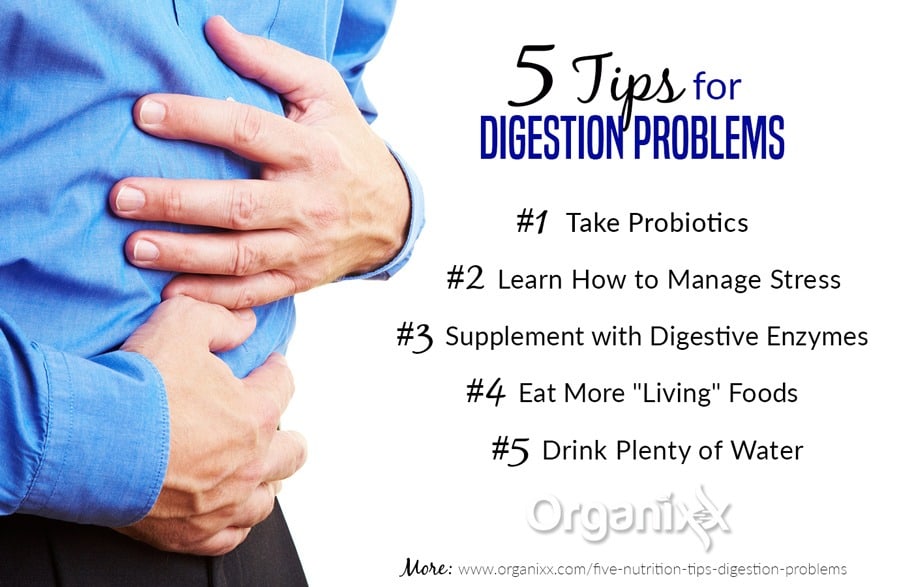
#4: Supplement with Digestive Enzymes
Similar to probiotics, the digestive enzymes that your body naturally produces are designed to break down the foods you eat into substances that your body can use for maintenance and repair. Your body also relies upon food enzymes that exist naturally in raw and fermented foods.
Unfortunately, these are foods that many people do not consume nearly enough of to maintain a healthy digestive flow, often leading to digestion problems.
Full-spectrum digestive and proteolytic enzyme supplements can help bridge the gap and give your body that extra boost it needs to take full advantage of the nutrition you put into it. This still requires eating healthy and following the other advice outlined in this article, but it’s also an important piece of the digestive puzzle that you simply can’t overlook when trying to correct or avoid digestive disease.
#5: Eat More “Living” Foods
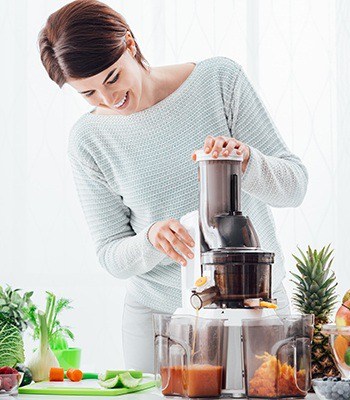 Many of these recommendations converge in diet, which, when properly aligned, can tie in probiotics, enzymes, and hydration into one single package.
Many of these recommendations converge in diet, which, when properly aligned, can tie in probiotics, enzymes, and hydration into one single package.
“Living” foods are foods that haven’t been processed, cooked, or pasteurized.
In many ways, these types of foods represent an all-in-one solution for digestive problems and disease.
Raw foods grown without chemicals or irradiation in healthy soil are the healthiest kinds of foods you can feed your body. Raw foods that have been fermented, cultured, and/or sprouted using traditional preservation methods can be even better.
This is because they contain enhanced levels of probiotic bacteria and enzymes, both of which unlock the full nutrition potential of food and make it optimally bioavailable for the body. Just remember to chew your food thoroughly to make it suitable for reception into your digestive tract.
Some examples of living foods that can help with digestion:
- Chia, hemp, and flaxseeds
- Organic fruits and vegetables
- Probiotic foods like kombucha, kimchi, and kefir
- Raw milk, and especially that of a goat, sheep, or camel
- Fresh juices from things like wheatgrass, celery, and green apples
- Therapeutic herbs like dandelion leaf and cilantro, both of which stimulate enzyme production


